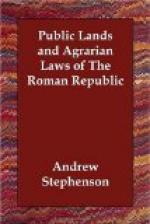This somewhat circumstantial account has revealed to us that at this time it took a majority of the tribunes to veto an act of their colleague. At the time of the Gracchi the veto of a single tribune was sufficient to hinder the passage of a law, and Tiberius was for a long time thus checked by his colleague, Octavius. Then the tribunician college consisted of ten members, and it would be no very difficult thing to detach one of the number either by corruption or jealousy. But it is evident that, at the time we are considering, it took a majority of the tribunes to veto an act of a colleague; moreover, the college consisted of five members. This latter fact is seen in the statement of Livy,[10] when he mentions the opposition which four of the tribunes offered to their colleague, Pontificius, in 480. In this same case he attributes to Appius Claudius the conduct which Dionysius attributed to him in the previous year. But he causes Appius to state, in his speech favoring the corruption of certain tribunes, “that the veto of one tribune would be sufficient to defeat all the others."[11] This is contrary to the statement of Dionysius[12] and would seem improbable, for, if the opposition of one tribune was sufficient, the patricians would not have deemed it necessary to purchase four. That would be contrary to political methods.
Of the two propositions of the tribunes, Icilius, in 482, and Pontificius, in 480, the results were the same. The opposition of their colleagues defeated them. But this persistent opposition rather than crushing seemed to stir up renewed attacks. We have seen the tribunes, Menius, Icilius, and Pontificius, successively fail. The next movement was led by a member of the aristocracy, Fabius Caeso,[13] consul for the third time in 477. He undertook to remove from the hands of the tribunes the terrible arm of agrarian agitation which they wielded constantly against the patricians, by causing the patricians themselves to distribute the domain lands equally among the plebeians, saying: “that those[14] persons ought to have the lands by whose blood and sweat they had been gained.” His proposition was rejected with scorn by the patricians, and this attempt at reconciliation failed as all the attempts of the tribunes had. The war with Vaii which, according to Livy, now took place hindered for a while any agrarian movements; but, in 474, the tribunes Gaius Considius and Titus Genucius made a fruitless attempt at distribution, and, in 472, Dionysius speaks of a bill brought forward by Cn. Genucius which is probably the same bill.




